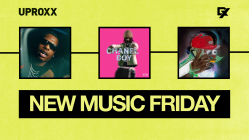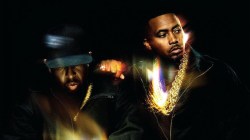When you think of southern rap, Arkansas probably isn’t the first state that comes to mind. There isn’t a prominent, nationally-recognized subgenre associated with any of its cities, like trap in Atlanta, bounce in New Orleans, or screw in Houston. It’s a small and sleepy state that in many ways contrasts with the larger-than-life nature of rap stardom, with 1017-signee BiC Fizzle himself going so far as to describe Arkansas as just “>“a whole bunch of woods and shit.”
BiC Fizzle’s burgeoning come-up becomes even more unlikely when you consider he hails not from one of the state’s population centers like Little Rock or Fayetteville — the nation’s 118th and 411th most populous cities, if you’re keeping score — but from Blytheville, a small town of about 13,000 that’s around an hour’s drive from Memphis.
For that reason, you might expect Fizzle’s stylistic origins to lie in Memphis — his frequent collaborator and fellow Blytheville native, Cootie, clearly shares a lot of DNA with contemporary Memphis rappers like Young Dolph and Key Glock — but on Clark Street Baby, it’s much easier to trace Fizzle’s lineage to Baton Rouge. Fizzle states this outright, citing Kevin Gates and NBA YoungBoy as the artists he listened to most growing up. Like YoungBoy, Fizzle excels over somber, string-based ballads that chronicle heavy subjects like trauma and drug abuse. “I don’t feel pain, drug user, I’m feelin’ like Whitney/Purple cup, fuck my kidney/But what a hell of a feeling,” he raps on “Don’t Panic.”
References to sipping syrup are a dime a dozen in rap, but Fizzle’s experiences coalesce on album-standout “Product of the Trenches.” “Out on the road and all I’m thinkin’ ’bout is home, look/Tall trees, abandoned houses, corner stores, look/A lot of junkies, but I treat ’em like they equal/‘Cause you can learn a lot of shit from those people.” Nuggets of wisdom like this highlight Fizzle’s talent and further potential as a deeply introspective writer. It portrays him as someone who’s wise beyond their years and values people of all creeds and walks of life, ultimately understanding that he could just as easily have ended up an addict on the streets himself.
At times, however, the YoungBoy influence can be so prominent that it’s distracting. No one would blame you for momentarily mistaking “Turnt Shit” for a YoungBoy song, and the way Fizzle flows and structures his verses on portions of “Servin” bears a striking resemblance to NBA YoungBoy’s “Wat Chu Gone Do.” But Fizzle is still young — he signed to Gucci’s 1017 label while he was still in high school and only graduated last spring — and he differentiates himself from YoungBoy by taking an approach that’s focused less on melody and more on flow and dexterous rapping. This is often highlighted on more hectic, fast-paced tracks like “Where U From,”, and when collaborating with rappers who share similar southern-country origins: Birmingham’s Big Yavo, Mobile’s Li Rye, and, of course, Blytheville’s own Cootie. While the aforementioned rappers race to match or exceed Fizzle’s energy, KATO2X’s more laidback, almost Valee-esque delivery on “Reminded Myself” provides Fizzle with a nice foil — and a much-needed respite after Li Rye’s high-octane delivery on the previous track, “Get Down Gang.”
Sequences like “Get Down Gang” to “Reminded Myself” to “Don’t Panic” demonstrate a specific attention to album arrangement — but this unfortunately doesn’t extend past the first disc. Clark Street Baby’s biggest downfall is its length. Inflating streaming stats is a common occurrence in rap these days, but Fizzle’s debut album is a particularly egregious offender: the entire second disc is comprised of songs already released on Gucci Mane’s So Icy label compilation albumsReview – Gucci Mane & 1017 ‘So Icy Boyz’ Is A Standard Compilation Tape Where No One Shines. In fact, eight of the 16 songs that make up the second disc have already appeared on not just one of these compilation albums, but three of them, essentially making it a compilation of compilations of compilations, a practice Gucci has been lazily peddling for years.
With the first disc being dedicated to previously unheard music and the second devoted to these compilation tracks, the division couldn’t be more clear. There’s nothing inherently wrong with tacking a second disc of bonus cuts onto an album, but in the streaming era it runs the risk of muddying an artistic vision. Spotify doesn’t even separate albums into discs on mobile, so all listeners will see is a 31-track album.
Side A of Clark Street Baby is a little over 35 minutes long with only two songs cracking the three-minute mark. It’s concise, thoughtfully sequenced, and has an emotional and logical endpoint with the one-two punch of the down-trodden-turned-triumphant “Can’t Go Broke” and the victory lap of “Outro.” But as a two-disc album, it becomes bloated and aimless, ending with a stutter that cheapens the experience. There’s certainly some great songs on the B-side — you could easily slide a couple of the best tracks like “Chief” and “Clark Street Baby” onto the first disc — but it’s not worth sifting through Gucci throwaways like “Red Flag.” Gaming the streaming system is a fact of life in the DSP ecosystem — but it’s unfortunate that it so often comes at the expense of the art itself.

![50 Cent Shares Unseen Diddy Footage From Netflix Documentary: "[It] Shows You His Character"](https://hiphopdx.com/wp-content/uploads/2025/12/50-cent-diddy-documentary-trailer-unseen-footage.jpg?w=250)








hhjh